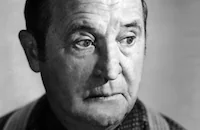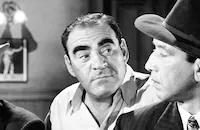Hello Frisco, Hello
Cast & Crew
Bruce Humberstone
Alice Faye
John Payne
Jack Oakie
Lynn Bari
Laird Cregar
Film Details
Technical Specs

Synopsis
At the turn of the century, entertainers Trudy Evans, Johnny Cornell, Dan Daley and Beulah Clancy struggle to become successful in the Barbary Coast section of San Francisco. Trudy is the star singer of the act and is in love with Johnny, who also acts as the group's manager. Despite his humble origins, Johnny has aspirations for a better life on Nob Hill, the high society part of town. After the quartet is fired from Sharkey's Colliseum for distracting the customers from drinking, Johnny concocts a scheme of singing in the streets and extorting money from saloon owners who want them to go away. Dan and Beulah are skeptical of Johnny's ambitions but stay in the group for Trudy's sake. Soon Johnny's idea pays off and with the money he opens his own club, The Grizzly Bear, and features Trudy as the main attraction. Despite the success of The Grizzly Bear, and other clubs he soon opens, Johnny still dreams of entering society and becomes involved with snobbish socialite Bernice Croft. Trudy, meanwhile, longs for Johnny, although it is obvious that he thinks of her as a singer first and a woman second. When Bernice loses her fortune due to bad investments, Johnny buys most of her possessions at an auction. Dan warns him about becoming involved with Bernice, but Johnny brushes him aside and offers to buy Bernice's house. Seeing a way out of her predicament, Bernice wheedles Johnny into proposing to her so that she will be able to maintain her standard of living. Trudy is devastated and accepts the offer of impressario Douglas Dawson to star in his new London show. While Trudy is a success abroad, Johnny re-opens the opera house founded by Bernice's late father. As Johnny spends his money on the opera house and Bernice's flighty friends, his Barbary Coast clubs go out of business until only The Grizzly Bear remains. Dan urges Johnny to ask Trudy to return, but Johnny stubbornly refuses, and soon after, Dan and Beulah are again working at Sharkey's after The Grizzly Bear closes. Johnny is forced to close the opera house as well, and during an argument, Bernice coldly informs him that she married him only for his money. Johnny gives her the deed to the house and after obtaining a divorce, works as a barker for a sideshow. Trudy, who has returned to San Francisco for a new show, is told about Johnny's troubles by Dan and Beulah. Trudy then engineers a ruse whereby Sam Weaver, a prospector whom Johnny has staked for years, pretends to have struck it rich and repays Johnny. Johnny is able to re-open The Grizzly Bear with the money, although on opening night, a drunken Sam reveals its true source. Johnny's pride overwhelms him and he is about to close the show when Dan tricks him into singing onstage with Trudy. While performing with Trudy, Johnny finally realizes that he loves her, and they embrace as Trudy performs her signature song, "You'll Never Know."

Director

Bruce Humberstone
Cast

Alice Faye

John Payne

Jack Oakie
Lynn Bari

Laird Cregar

June Havoc

Ward Bond
Aubrey Mather

John Archer

Frank Orth
George Lloyd
Frank Darien
Harry Hayden
Eddie Dunn
Charles Cane
Frank M. Thomas
Kirby Grant
Mary Field

George Barbier
James Sills
Marie Brown

Ralph Dunn
Esther Dale
Edward Clark
Gino Corrado
Adia Kuznetzoff

Fortunio Bonanova
Lorraine Elliott
Ruth Gillette
Edward Earle
Ken Christy

James Flavin
Jackie Averill
James Clemons Jr.
John Sinclair
Jack Stoney
James Clemons
Fred Brown
Larry Valli
Ed Mundy
Ted North
Bob Perry
Bruce Warren
Crew
Maurice Abrahams
Joseph E. Aiken
Thomas S. Allen
James Basevi
Irving Berlin
George Botsford
Harry Brand
Gene Buck
Charles [g.] Clarke
Grant Clarke
Allen Davey
Viña Delmar
Gus Edwards
Robert Ellis
Ida Emerson
Fanchon
Paul S. Fox
George Gershwin
Ira Gershwin
William Goetz
Mack Gordon
Sid Grauman
Roger Heman
Charles Henderson
Charles Henderson
Louis A. Hirsch
Helene Holmes
Joseph E. Howard
Ollie Hughes
Henri Jaffa
William Jerome
Walter Jurmann
Gus Kahn
Natalie Kalmus
Bronislaw Kaper
Will Letters
Boris Leven
Thomas Little
Helen Logan
Earl Luick
Richard Macauley
Edward Madden
Joseph Mccarthy
James Mcgavisk
William C. Mckenna
Barbara Mclean
Lewis F. Muir
C. W. Murphy
Stanley Murphy
Emil Newman
Hermes Pan
Guy Pearce
William Perlberg
Dave Radford
Val Raset
Helen Rose
Aaron Rosenberg
Jean Schwartz
Fred Sersen
Milton Sperling
Harry Von Tilzer
William Tracey
Harry Warren
Percy Wenrich
Richard A. Whiting

Film Details
Technical Specs

Award Wins
Best Song
Award Nominations
Best Cinematography
Quotes
Trivia
Memo to the exchange managers and exhibitors and also sniped to the press book from 20th Century-Fox: CORRECTION! Please eliminate the following credits on "Hello, Frisco, Hello": George Barbier...from the cast. Hermes Pan...as co-stager of the dance sequences.
Notes
According to the Twentieth Century-Fox Produced Scripts Collection, located at the UCLA Arts-Special Collections Library, Robert Hopkins, Len Hammond and Jo Swerling worked on early versions of this film's screenplay. Their work was not included in the final picture, however. Late 1941 Hollywood Reporter news items reported that Ken Englund and Harold Friedman had been assigned to work on the script, but their contribution to the completed film appears doubtful. According to a March 10, 1942 Hollywood Reporter news item, writer Richard Macauley was being considered to direct the picture. An September 11, 1942 Hollywood Reporter news item noted that producer Milton Sperling was leaving the studio to join the Marines, and that his duties would be assumed by Lee Marcus. Hollywood Reporter production charts list William Perlberg as the film's producer, and it is possible that either he or Marcus supervised the film during shooting, although Sperling receives sole onscreen credit as the producer.
According to a June 20, 1941 Hollywood Reporter news item, Gene Tierney was set for a top role in the picture. A February 6, 1943 Los Angeles Times item reported that Carole Landis and Betty Grable would be the film's stars, while a February 10, 1942 Hollywood Reporter item noted that Anne Baxter had been set in the picture. Other Hollywood Reporter news items include Reginald Gardiner and Harry Green in the cast, but they did not appear in the released picture.
Although a November 27, 1942 studio press release announced that newspaper columnist Harry Crocker would appear in the film playing one of his own ancestors, who were socially prominent bankers in San Francisco, his appearance in the completed picture has not been confirmed. As noted by studio publicity, technical advice about turn-of-the-century San Francisco was provided by showman Sid Grauman, the owner of the renowned Chinese Theatre in Hollywood. The picture marked the return to the screen of Alice Faye, who had taken time off to have her first child following filming of Week-End in Havana in 1941, and the last film appearance of John Payne, who joined the Army Air Corps, until the 1945 picture The Dolly Sisters. According to a modern source, "I Gotta Have You," a song composed by Mack Gordon and Harry Warren, was recorded for the picture but cut before its release. Gordon and Warren received an Academy Award for Best Original Song for "You'll Never Know," which became Faye's signature song.
According to Hollywood Reporter news items, San Francisco mayor Angelo Rossi met with studio executive Joseph Schenck in February 1943 to protest the use of the nickname "Frisco" in the film's title. Armed with petitions from several prominent civic organizations, Rossi persuaded Schenck to change the film's title to Hello, San Francisco, Hello in all its advertising in that city. Laurence Hirsch, the executor of the estate of composer Louis A. Hersch, who co-wrote "Hello, Frisco, Hello" with Gene Buck, brought an infringement suit against two music publishers and Twentieth Century-Fox, claiming that they did not have the right to use the song in the picture. His suit was dismissed in June 1945, however. Conductor and musician Pietro Cimini filed a lawsuit against the studio in 1943, in which he claimed that he was ridiculed and defamed, according to a May 1943 Daily Variety news item. Referring to the scene in which "Johnny" closes the opera house, thereby enraging a musician character named "Chambinni," Cimini asserted that the film depicted him as "inefficient and incompetent." The disposition of Cimini's suit has not been determined.
Faye recreated her role in the November 15, 1943 Lux Radio Theatre presentation of the story, which co-starred Robert Young. Hello Frisco, Hello is an uncredited remake of the 1936 Twentieth Century-Fox film King of Burlesque, which was also based on Viña Delmar's original, unpublished story entitled "The Day Never Came." The 1936 film was directed by Sidney Lanfield and starred Faye, Warner Baxter and Jack Oakie (see AFI Catalog of Feature Films, 1931-40; F3.2291).












